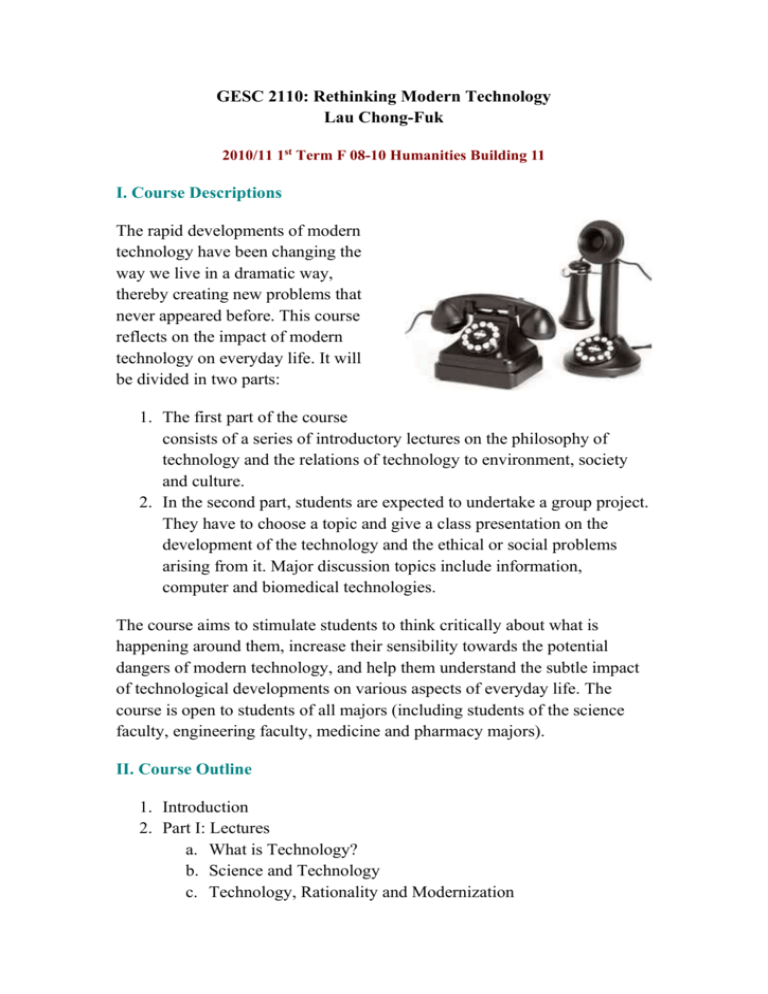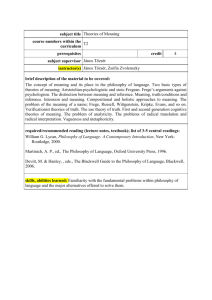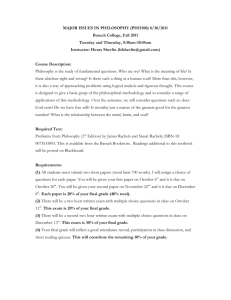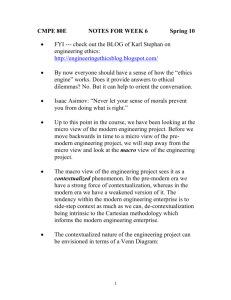GESC 2110: Rethinking Modern Technology
advertisement

GESC 2110: Rethinking Modern Technology Lau Chong-Fuk 2010/11 1st Term F 08-10 Humanities Building 11 I. Course Descriptions The rapid developments of modern technology have been changing the way we live in a dramatic way, thereby creating new problems that never appeared before. This course reflects on the impact of modern technology on everyday life. It will be divided in two parts: 1. The first part of the course consists of a series of introductory lectures on the philosophy of technology and the relations of technology to environment, society and culture. 2. In the second part, students are expected to undertake a group project. They have to choose a topic and give a class presentation on the development of the technology and the ethical or social problems arising from it. Major discussion topics include information, computer and biomedical technologies. The course aims to stimulate students to think critically about what is happening around them, increase their sensibility towards the potential dangers of modern technology, and help them understand the subtle impact of technological developments on various aspects of everyday life. The course is open to students of all majors (including students of the science faculty, engineering faculty, medicine and pharmacy majors). II. Course Outline 1. Introduction 2. Part I: Lectures a. What is Technology? b. Science and Technology c. Technology, Rationality and Modernization d. Technology, Society and Enivornment e. Humans vs. Machines: Artificial Intelligence f. Basic Concepts of Ethics 3. Part II: Presentations a. Biomedical Technologies i. Human Cloning ii. Genetic Engineering iii. Stem Cell Research b. Information and Computer Technologies i. Intellectual Property ii. Privacy vs. Security iii. Free Expression vs. Censorship c. Other Issues of Technology II. Assessment Method 1. 2. 3. 4. 5. Final Take-Home Exam: 30% Project Presentation: 30% Project Essay: 20% Comment: 10% Class Performance: 10% III. References Basic Readings: 1. V. Dusek, Philosophy of Technology: An Introduction, Oxford: Blackwell, 2006. 2. J. Rachels/S. Rachels, The Elements of Moral Philosophy, 5th ed., New York: McGraw-Hill, 2006. 3. J. Olen et. al., ed., Applying Ethics: A Text with Readings, Belmont: Wadsworth Publishing, 2004. 4. R. A. Spinello, Cyberethics: Morality and Law in Cyberspace, 3rd ed., Sudbury, MA: Jones and Bartlett Publishers, 2006. Supplementary Readings: 1. R. M. Baird et. al., ed., Cyberethics: Social and Moral Issues in the Computer Age, Amherst, NY: Prometheus Books, 2000. 2. T. L. Beauchamp/L. Walters, L., ed., Contemporary Issues in Bioethics, Belmont, CA: Wadsworth Pub., 1999. 3. G. A. Cohen, Karl Marx's Theory of History: A Defence, expanded ed., Princeton, N.J.: Princeton UP, 2001. 4. J. Copeland, Artificial Intelligence: A Philosophical Introduction, Cambridge, Mass.: Blackwell, 1993. 5. H. L. Dreyfus, What Computers Still Can't Do: A Critique of Artificial Reason, Cambridge, Mass.: MIT Press, 1993. 6. W. Dudley, ed., Genetic Engineering: Opposing Viewpoints, San Diego, CA: Greenhaven Press, 1990. 7. S. L. Edgar, Morality and Machines: Perspectives on Computer Ethics, 2nd ed., Sudbury, Mass.: Jones and Bartlett Publishers, 2003. 8. J. Ellul, The Technological Bluff, trans. G. W. Bromiley, Grand Rapids: Eerdmans, 1990. 9. J. Ellul, The Technological Society, trans. J. Wilkinson, London: J. Cape, 1965. 10. W. Glannon, Genes and Future People, Oxford: Westview Press, 2001. 11. T. Halbert/E. Ingulli, Cyberethics, 2nd ed., Mason, Ohio : West Legal Studies, 2005. 12. M. Heidegger, The Question Concerning Technology and Other Essays, trans. W. Lovitt, New York: Harper & Row, 1977. 13. D. Ihde, Philosophy of Technology: An Introduction, New York: Paragon House, 1993. 14. D. G. Johnson, Computer Ethics, Englewood Cliffs, NJ: Prentice Hall, 1994. 15. L. Lessig, Code and Other Laws of Cyberspace, New York: Basic Books, 1999. 16. C. Mitcham, Thinking Through Technology, Chicago: University of Chicago Press, 1994. 17. F. Rapp, Analytical Philosophy of Technology, Dordrecht: Reidel, 1981. 18. R. C. Scharff/V. Dusek, ed., Philosophy of Technology: The Technological Condition: An Anthology, Oxford: Blackwell Publishers, 2003. 19. T. Schick, Jr./L. Vaughn, How to Think about Weird Things: Critical Thinking for a New Age, 4th ed., New York: McGraw-Hill, 2005. 20. E. Schuurman, Perspectives on Technology and Culture, Potchefstroom: Institute for Reformational Studies, 1997. 21. H. A. Simon, The Sciences of the Artificial, Cambridge: MIT Press, 1996. 22. R. A. Spinello/H. T. Tavani, ed., Readings in CyberEthics, 2nd ed., Sudbury, MA: Jones and Bartlett Publishers, 2004. 23. B. Steinbock et. al., ed., Ethical Issues in Modern Medicine, Boston: McGraw-Hill, 2003. 24. M. J. de Vries, Teaching About Technology: An Introduction to the Philosophy of Technology for Non-Philosophers, Dordrecht: Springer, 2005. 25. A. F. Westin, Privacy and Freedom, New York: Atheneum, 1967.









